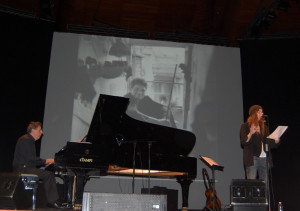
Al mio amico Gianni Cela,
a cui questo concerto
sarebbe piaciuto molto:
Though you might hear laughin’,
spinnin’, swingin’ madly across the sun,
It’s not aimed at anyone, it’s just escapin’ on the run
And but for the sky there are no fences facin’.
Bob Dylan
Le ferrovie sono molto importanti per l’America, favoriscono gli spostamenti di merci e portano le persone in qualunque posto vogliano andare. Attenzione però, perché per i nostri bambini, giocare vicino ai binari può essere molto pericoloso. Bisogna anche insegnare ai ragazzini a non assumere comportamenti potenzialmente dannosi come, ad esempio, il lanciare pietre contro i treni o sistemare oggetti sopra le rotaie. Stati Uniti, 1955. La compagnia ferroviaria Southern Pacific diffonde il suo filmato educativo per la sicurezza, mostra coi suoi bei colori saturi i piccoli americani con la riga da un lato e i cestini per il pranzo, enormi treni e fabbriche dalle alte ciminiere. In quel periodo Allen Ginsberg scrive e legge per la prima volta in pubblico a S. Francisco il suo poema Howl, quell’Urlo che gli costerà anche un processo qualche anno più tardi in quanto le autorità volevano censurare i suoi riferimenti a pratiche sessuali di vario genere e a droghe illecite.
Lo scorso mese (13 aprile, Auditorium Parco della Musica) a Roma, due grandi amici di Ginsberg, Patti Smith e il compositore Philip Glass, con l’evento The Poeat Speaks, decidono di rendere omaggio al poeta beat in un concerto di letture di sue opere. Il tutto è inserito nella rassegna My Festival, creata dalla stessa Patti Smith e che l’ha vista impegnata nella Capitale per quasi tutto il mese di aprile. Ginsberg è stato sempre molto legato alla musica, aveva imparato a suonare l’armonium e ha scritto poesie-canzoni assieme a Bob Dylan, molti dei suoi Blues sono raccolti nella bella edizione uscita in Italia due anni fa per Il Saggiatore. Lo stesso Philip Glass collaborò con lui negli anni Novanta e gli dedicò anche la sua “Symphony N. 6. Plutonium Ode”. Patti Smith inizia a recitare con la sua voce intensa e gli accordi arpeggiati tipici di Glass fanno da sfondo. “Wichita Vortex Sutra” è uno dei primi componimenti letti, un inno contro le guerre. Dietro di loro, sul palco, vengono proiettate le foto di Ginsberg e dei suoi amici beat: Gregory Corso, il più romantico del gruppo, grande amante della Poesia di John Keats e sepolto vicino al poeta inglese nel cimitero acattolico di Roma. E’ la stessa Smith a ricordarlo al pubblico e a consigliare di passare a trovarlo per porgergli un saluto: Say Hello to Gregory! ha detto. Poi Jack Kerouac, William Borroughs, Ferlinghetti. La loro storia inizia alla fine degli anni ’50, sono tutti ragazzi uniti dalla voglia di cercare, tramite la scrittura e la vita stessa, dei valori nuovi, altri modi di comunicare. Sono sintonizzati sulla grammatica dei grandi musicisti be-bop, sui soli spontanei e fluidi di Charlie Parker, Dizzy Gillespie, Thelonius Monk. Finchè non incontrano Neal Cassady, vecchio pazzo, lui il suono cosmico, vagabondo figlio di un vagabondo, l’amico e eroe di tutti i beat. E’ lui l’incarnazione del pensiero che si andava formando. Il “padre che mai trovammo” dice il finale di On The Road. Il padre è forse l’unica cosa che ci fa rimanere attaccati alla terra e che ci fa sentire continui a una storia, se poi questa storia pesa, l’unica è spogliarsi di tutto quello che abbiamo sulle spalle e buttarsi in avanti, proiettarsi verso un futuro accolto nonostante tutto. Questo fu Cassady e tutto divenne mito per i famosi “giovani”. E potè essere così solo nei grandi cieli del New Jersey che avevano il vantaggio di non aver mai visto l’ombra grande e nera di un aeroplano, ombra che l’Europa conosceva bene. In Italia avevamo, in quei tempi, tra i ’50 e i ’60, grandi scrittori e gruppi letterari, come sempre li abbiamo avuti ma si può dire che i beat inventarono il rock e tutto quello che ha voluto dire comunicare fino ad oggi. O almeno comunicare in un certo modo. Da noi la lingua poetica delle avanguardie restava, e questo è stato in fondo il suo merito, immersa nella cortesia zuccherosa delle prime annunciatrici TV, aveva captato il modo in cui la parola dei nuovi centri industriali attraeva i significati. Si vedeva che a noi pesavano gli aspirapolveri, le pubblicità dei detersivi. Loro, i beat, vivevano in posto dove la televisione non doveva giustificarsi, non aveva bisogno di trovare posto accanto allo Stilnovismo, erano spavaldi, erano fichi. Vuol dire questo la Letteratura? Anche.
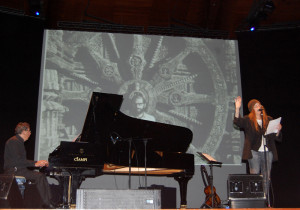
Sul palco, durante il concerto, salgono anche Jesse Paris Smith, figlia di Patti e notevole pianista, assieme a Lenny Kaye, storico chitarrista della band. Intonano Ghost Dance in una bella versione acustica, solo piano, voce e chitarra senza alcun effetto. Segue Pissing in a River. L’intermezzo è affidato interamente a Philip Glass che esegue tre suoi Etudesper pianoforte. Le note ripetute e frettolose, le tensioni della musica di Copland e Barber, maestri del primo Novecento americano che Glass dimostra di riconoscere come suoi punti di partenza da cui sviluppare il suo linguaggio: il minimalismo, gli omaggi al teatro, alla letteratura e alla musica per film.
I versi di Ginsberg derivano comunque da una tradizione che, nel caso degli Stati Uniti, è quella dell’incontro, la condizione dell’Europeo obbligato ad adattarsi al nuovo e a fondersi con l’istinto, le voci e le problematiche delle comunità afroamericane, la parola assume direzione, velocità, sonorità. E poi lo sguardo verso l’Oriente, i testi sacri dell’India, la filosofia Zen, il tentativo della lingua inglese di riappropriarsi della Natura. In uno degli ultimi testi letti durante la serata, Footnotes to Howl, Ginsberg proclama la santità di tutti gli esseri e tutte le cose: Everything is holy! everybody’s holy! everywhere is holy! everyday is in eternity! Everyman’s an angel! Si percepisce la sensazione di essere fratelli dello stesso viaggio appena il pubblico sente intonare People Have The Power come ultimo pezzo del concerto, l’esito: tutti insieme sotto al palco. You have the power, don’t forget it! conclude Patti stringendo le mani a tutti. Sono parole facili in tempi difficili ma il più bel rock è quello facile, quello che proviene da una voce e da un’anima vera come in questo caso, cosa dovremmo fare? Dobbiamo crederci?
English Text
Though you might hear laughin ‘,
spinnin ‘, swingin’ madly across the sun,
It’s not aimed at anyone, it’s just escapin ‘on the run
And but for the sky there are no fences facin ‘.
Bob Dylan
Railways are very important for America, favor the movement of goods and bring people wherever they want to go. Be careful though, because for our children, playing near the tracks can be very dangerous. You also need to teach kids not to take potentially harmful conduct such as, for example, throw rocks at trains or placing objects on top of the rails. USA, 1955. The Southern Pacific railroad company spreads its educational film for safety, with its beautiful saturated colors show the Americans with their hair line on one side and lunch boxes, huge trains and factories with tall chimneys. At that time, Allen Ginsberg wrote and read for the first time in public in S. Francisco on his poem “Howl,” that led him into a process a few years later because the authorities wanted to censor his references to sexual practices of various kinds and illicit drugs.
This past Saturday, April 13 in Rome, Italy, at Auditorium Parco della Musica, two great friends of Ginsberg, Patti Smith and the composer Philip Glass, during an event called “The Poeat Speaks”, they decide to pay tribute to beat poet in a concert of readings of his works. Everything is included in the exhibition “My Festival”, created from the same Patti Smith for wich she has been busy in Rome for almost the entire month of April. Ginsberg has always been closely tied to the music, he learned to play the harmonium and wrote poems-songs along with Bob Dylan, many of his “Blues” are collected in the beautiful edition released in Italy two years ago for “Il Saggiatore”. The same Philip Glass collaborated with him in the nineties and also dedicated his “Symphony No. 6. Plutonium Ode”. Patti Smith began acting with his rich voice and arpeggiated chords typical of Glass resonate in the background. “Wichita Vortex Sutra” is one of the first poems to be read, a hymn against war. Behind them, on the stage, are projected photos of Ginsberg and his beat friends: Gregory Corso, the most romantic of the group, a great lover of poetry of John Keats and buried near the English poet in the Protestant Cemetery in Rome. Patti Smith reminds it to the public and advise gently to visit him to offer him a greeting: “Say Hello to Gregory!” she said with great sweetness. Then Jack Kerouac, William Burroughs, Ferlinghetti. Their story began in the late 50s, they are all boys united by the desire to seek, through writing and life itself, new values and new ways of communicating. They were tuned to the grammar of the great be-bop musicians, on the spontaneous and fluid solos of Charlie Parker, Dizzy Gillespie, Thelonious Monk. Until they met Neal Cassady, crazy old man, he was the cosmic sound, a tramp son of a tramp, great friend and hero of all beats. And he was the incarnation of thought that was forming. The “father we never found,” says the ending of “On The Road”. The father is perhaps the only thing that makes us cling to the earth and that makes us feel continue to a history, if we weigh this story, the only solution is to divest ourselves of all that we have on the back and jump forward, projecting towards a welcomed future after all. This was Cassady and everything became myth for the famous “young people”. It could be so, only in the big skies of New Jersey wich had the advantage of never having seen the shadow of a large black airplane, a shadow that Europe knew very well. In Italy we had in those days, between ’50s and ’60s, great writers and literary groups, as always we had them but you can tell that beat invented rock and everything that mean “to communicate” to this day. Or at least to communicate in a certain way. In Italy, the poetic language of avant-garde remained, and this was at the bottom of his merit, dipped in sugary courtesy of the first TV announcers, had picked up the way in which the word of the new industrial centers attracted the meanings. You could see that we weighed vacuum cleaners, the detergents advertising. The beat writers lived in a place where television did not have to justify itself, it did not need to find a place next to Stilnovo, they were arrogant, they were cool. Does this mean Literature? Even.
On stage, during the concert, there is also Jesse Paris Smith, young daughter of Patti and remarkable pianist, along with Lenny Kaye, guitarist of the band. They sing “Ghost Dance” in a beautiful acoustic version with piano, voice and guitar with no pedal effects. Then they play “Pissing in a River”. The interlude is carried out entirely by Philip Glass performing three of his Etudes for piano. The repeated notes and hasty, the tensions of the music of Copland and Barber, masters of the early american twentieth century that Glass proves to recognize as its starting point from which to develop his own language: the minimalism, tributes to theater, literature and music for film.
The verses of Ginsberg originate from a tradition that, in the case of the United States, is the “meeting”, the condition of the European obliged to adapt to the new and merge with the instinct, the voices and concerns of the African American communities, the word takes direction, speed, sound. And then a look to the East, the sacred texts of India, the Zen philosophy, the attempt of the English language to regain possession of Nature. In one of the last texts read during the evening, “Footnotes to Howl,” Ginsberg proclaims the sanctity of all beings and all things: “Everything is holy! everybody’s holy! everywhere is holy! everyday is in eternity! Everyman’s an angel! “You can sense the feeling of being brothers of the same trip as soon as the audience hears singing ” People Have The Power “as the last piece of the concert, the outcome: all together under the stage. “You have the power, don’t forget it!” Patti concludes shaking hands at all. They are easy words in hard times but the most beautiful rock music is easy, that which comes from a true voice and a soul as in this case, what should we do? We have to believe?
Donato Di Pelino (Roma, 1987) è avvocato specializzato nel Diritto d’autore e proprietà intellettuale. Scrive di arte contemporanea e si occupa di poesia e musica. È tra i fondatori dell’associazione Mossa, residenza per la promozione dell’arte contemporanea a Genova. Le sue poesie sono state pubblicate in: antologia Premio Mario Luzi (2012), quaderni del Laboratorio Contumaciale di Tomaso Binga (2012), I poeti incontrano la Costituzione (Futura Editrice, 2017). Collabora con i suoi testi nell’organizzazione di eventi con vari artist run space.




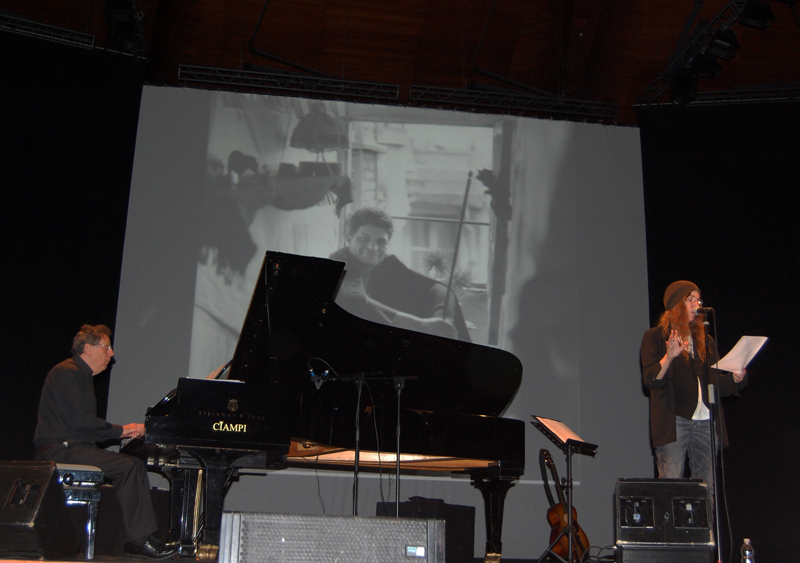

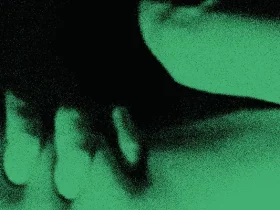
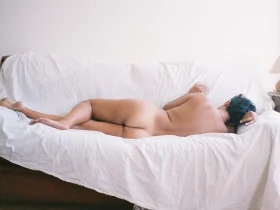
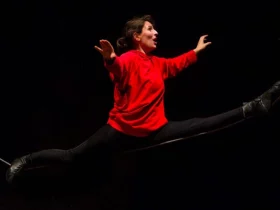
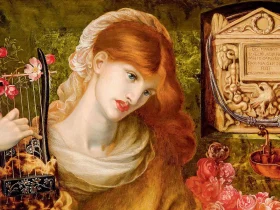

lascia una risposta